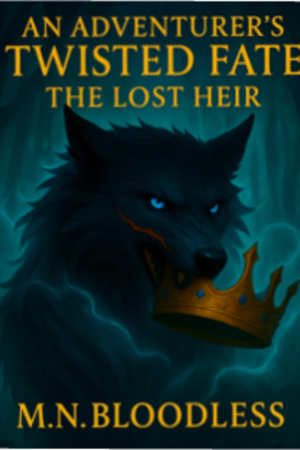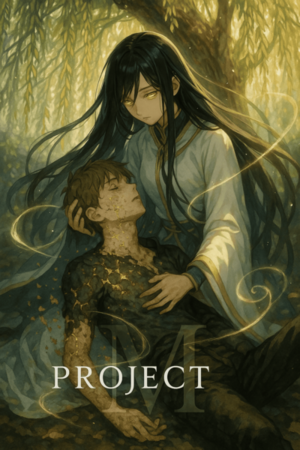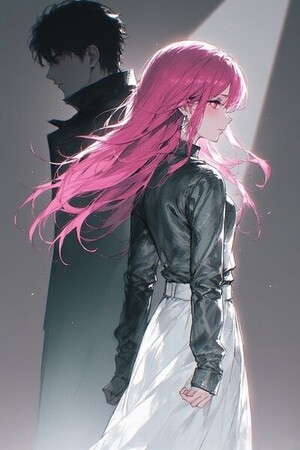Chapter 10:
Chapter 10: Another’s Memories
An Adventurer’s Twisted Fate: The Lost Heir
The moment we stepped into the great hall, I felt it.
Not pressure. Not dread.
Something subtler — like the air was too still. Too measured.
A man stood at the far end beneath the arching windows, hands folded neatly behind his back. His coat was jet black, traced with golden embroidery that shimmered faintly in the morning light. His blondish-yellow hair caught every glint, though it was his eyes that held me — brown, warm, but calculating. Like he was always three steps ahead in a conversation he hadn’t started yet.
He turned toward us and offered a short, elegant bow.
“Arthur. Rias.” His voice was refined, calm, and smooth. “I’m glad to finally meet you both. I am Count Leto Halia of House Halia.”
I didn’t reply at first. I felt Rias shift beside me, one hand gently gripping my sleeve. She could sense it too — something about this man didn’t belong to the world we were used to.
Leto continued, unbothered. “I received Duke Durak’s message just in time. I was already en route to Wolfhiem when his messenger found me.”
He studied me with interest. “You have your father’s eyes. Orpheus was… memorable.”
“Did you know him?” I asked.
“Well enough,” he said, cryptic. “But today is not about the past. It’s about preparing for your future.”
He stepped toward us, slow and composed, his hands still behind his back.
“The Dival Magic Academy entrance exam is one month from now. You and your sister lack the formal training most noble children have received since birth. Combat skills can be taught. Mana, practiced. But etiquette, history, general knowledge—”
He tapped his temple. “—that’s much harder to instill in time.”
“Are you going to teach us then?” I asked cautiously.
Rias tilted her head. “In a month?”
Leto nodded. “Precisely. I offer you what few in the world can: direct memory implantation. Also known as memory magic. You will know what you need to know. You’ll pass the exam, blend in among nobles, speak as they do, carry yourselves as if you were born to it.”
“But what’s the catch?” I asked, folding my arms.
He smiled faintly, as if expecting the question. “Pain. Extreme pain. Think of it like carving a book into your brain — every lesson etched into your mind with magical precision. It is not pleasant. And it cannot be rushed.”
“How long?” I asked.
“A week. Any faster, and the mind may fracture. One session per day. Each session more painful than the last — as your mind strains to hold what wasn’t earned.”
He made it sound so precise. So clinical.
But something in his gaze said he’d seen what happens when things go wrong.
“Why not all at once?” I asked, narrowing my eyes. “If it’s just memories, why not load them in and be done with it? What’s the real risk?”
Leto didn’t flinch. “Because the mind is fragile, Arthur. We don’t just place memories inside you — we engrave them. Painfully, deliberately.”
He paused. “Imagine carving an image into your skin. One cut, then another. It hurts, but it heals. Do it too many times, too quickly… and you bleed out.”
The room was silent again.
He met my gaze, unblinking. “The same principle applies here. Push too much into the mind at once, and it breaks. People lose themselves. Some forget who they are. Some don’t wake up at all.”
“And if we say no?” Rias asked evenly.
“Then you rely on what you already know. You will likely be underestimated. Perhaps humiliated. Or fail to qualify entirely.”
The silence that followed wasn’t awkward. It was deliberate — like a test.
“I understand this is not an easy decision. But I give you the choice freely.”
I turned to Rias. Her expression was unreadable, as always. “What do you think?” I asked quietly.
She didn’t hesitate. “We’ll endure it. If this is what we need to reach the academy… then we do it.”
I nodded once and looked back to Leto.
“Alright. We accept.”
He smiled again — not kindly, but with approval.
“Then we begin tomorrow.”
The silence that followed lingered a moment too long. Leto’s expression softened, but only slightly, like a man closing a book he wasn’t finished reading.
From behind us, Duke Durak’s voice cut through the tension.
“That will be enough for tonight.”
I turned. He had entered the hall quietly — just in time to hear the end of our conversation. His eyes flicked from me to Rias, then to Leto.
“You’ll both need rest if you’re to survive what comes next.”
There was no humor in his voice.
“Henry will escort you to your rooms,” the Duke added. “Fresh linens, warm meals, and peace — at least for tonight.”
Rias gave a small nod beside me. I was surprised by how calm she seemed.
I bowed my head slightly. “Understood.”
We turned to leave, but before we could step out of the hall, I heard the Duke speak again.
“Arthur.”
I stopped and looked back.
“You’ve done well to come this far. Be proud of that — even if tomorrow brings pain.”
I didn’t know how to respond. So I simply nodded once and left with Rias at my side.
As the door shut behind us, I glanced over my shoulder. The last thing I saw before it closed was the Duke walking toward Leto, his face unreadable.
Whatever they were about to discuss, it wasn’t meant for my ears.
But something told me it mattered.
A lot.
The next morning came far too soon.
Henry met us at our doors, bright and far too cheerful for what lay ahead. “Breakfast first,” he said, “because you may not want to eat afterward.”
We joined him in the dining hall, though I barely tasted the food. Rias sat calmly, eating without complaint. She always managed to stay composed—blind or not.
Once we were finished, Henry led us back to the great hall. Leto was already waiting.
“Good,” he said, glancing between us. “Let’s not delay.”
Two ornate chairs had been placed in the center of the hall, each fitted with thick leather straps. Cushions were laid beneath the bindings—comfort that felt more like mockery than kindness.
“I apologize for the restraints,” Leto said, gesturing for us to sit. “They’re necessary. The body’s instinct is to fight pain. This will keep you safe.”
A strip of hardened leather was handed to each of us. “Bite down when the spell begins,” he said. “You’ll need it.”
I felt the tension in Rias as she gripped my hand. Neither of us spoke. We simply nodded and sat.
Leto moved behind us, placing one hand on each of our heads.
“Echoes of Yesterday,” he whispered, and the spell began.
Pain exploded in my skull.
Not a burning or a sharp stab — but thousands of tiny cuts, like invisible blades dancing beneath my skin. They crept deeper with each passing second, carving, slicing, embedding themselves inside my mind.
I bit down hard into the leather, my scream muffled by the strap. My vision swam. Every muscle in my body tensed against the agony, but I couldn’t move — the bindings held me fast.
Beside me, I heard Rias scream through her own gag. Even through the haze, her pain hit harder than my own.
And just when I thought it couldn’t get worse… it did.
Each day, the cuts grew wider. Deeper. The second day felt like my skull was being peeled open. By the fifth, I couldn’t tell where the pain stopped and I began.
I remember nothing of the seventh day except the smell of sweat, the soaked leather in my mouth, and the imprint of my teeth permanently etched into it.
Then — silence.
It was over.
Leto stood before us, his face composed but pale. “It’s done,” he said softly. “Rest now. In a few days, the memories will surface. They’ll come like dreams… and soon, you’ll remember them as if they were always yours.”
He bowed once and turned to leave. “Farewell. When you wake, you’ll be someone new.”
Three days later, the dreams came.
No — not dreams. Memories.
Of court dining halls and ballroom dances. Of political games played over wine and laughter. Of etiquette so precise it bordered on obsession.
I remembered how to greet a noble by their station, how to eat a seven-course meal without looking like a peasant. I remembered the banners of noble houses I’d never seen… and the histories of kings from different eras, their victories and humiliations etched into my mind like I’d lived them myself.
It was terrifying.
Not because the memories hurt — but because they felt real.
I remembered laughing with people I’d never met. I remembered crying when a war ended — a war I never fought in. I remembered arguments I never had and oaths I never took.
And worst of all, I remembered them better than the sound of my mother’s voice.
That scared me the most.
Even now, days later, they still trickled in — fragments of knowledge slotting into place like puzzle pieces I never asked for. I bowed before portraits without thinking, spoke names I didn’t know I knew, and found myself judging silverware arrangements like it mattered.
It felt like someone had built a second version of me — smarter, sharper, colder — and locked him inside my head.
I tried to shake it. I trained. I walked. I sat with Sköll in the sun and tried to feel normal again.
It didn’t work.
A sharp knock came at the door. I turned.
Henry stood there, arms crossed and eyebrow raised. “Still breathing, I see.”
“Barely,” I muttered, rubbing the side of my head. “I feel like someone tried to carve history class into my skull with a chisel.”
“Sounds like it worked,” he said with a smirk. “You’ll be lecturing old nobles on their own family trees by next week.”
I snorted. “Looking forward to it. Can’t wait to correct some baron on how to hold a wine glass mid-duel.”
Henry chuckled. “You joke, but it’s happened. Once. Long story.”
I gave him a look. “Do I want to know?”
“Not really,” he replied. “Anyway, the Duke wanted me to tell you — you’ve got a guest.”
I blinked. “What, now?”
Henry nodded. “Waiting in the training grounds. Odd fellow. Cloaked, didn’t give a name. Just asked to wait.”
“Let me guess — won’t say why he’s here either?”
Henry grinned. “How’d you guess? You nobles really do come with memory upgrades.”
I rolled my eyes and headed toward the door.
“Hey,” Henry added as I passed him. “Try not to pick a fight. You’re still recovering.”
“No promises,” I said, and stepped outside.
The training yard was quiet.
The frost hadn’t yet melted from the grass, and the air held that crisp edge of morning steel. Sköll followed silently at my heel but stopped at the edge of the field, growling low in his throat.
A lone figure stood in the center — cloaked, still, as if waiting for the wind itself to give permission to speak.
He didn’t call out. Didn’t wave.
Just waited.
I slowed as I drew closer, my boots crunching faintly on the frost. My hand hovered near my sword, a habit now, instinct more than fear.
And then… I saw his face.
I knew him.
The realization slammed into me like a weight I wasn’t ready to carry.
My breath caught.
But I said nothing.
Not yet.
Because somehow… I knew this moment — this meeting — would change everything.




Please sign in to leave a comment.